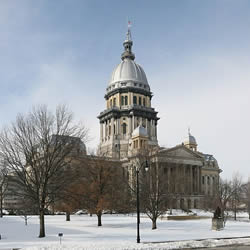This week members of the Illinois Gaming Board went before a State Senate committee to discuss a new gambling bill that has been proposed in the state, and suffice it to say, things got a bit heated between legislators and those who are tasked with overseeing the state’s gambling industry.
At issue is a bill proposed by State Senator Terry Link (D-Waukegan), who has been the sponsor of several bills in recent years that would expand gambling in Illinois. The latest, known as Senate Bill 1739, seeks to add slot machines at racetracks in the state, calls for the construction of five new land-based casinos including one in downtown Chicago, and would also regulate Internet-based wagering under an arm of the Illinois Lottery that would be created to deal with online betting.
The biggest bone of contention between Link and the current chairman of the Gaming Board (and former judge) Aaron Jaffe, is the Chicago casino property, which under the terms of Link’s bill would be owned and operated by the city, a proposition Jaffe clearly does not like.
The sit-down got off to a confrontational start, with Link offering a snide welcome to Jaffe, who has been highly critical of Link’s previous attempts to pass legislation related to gambling expansion.
“Thank you for being here today. It’s about time. We’ve waited for a long time for this meeting to take place. I’ve heard myself being criticized on TV, radio, everywhere else by you, judge, but it’s the first time we’ve had a meeting. So I appreciate you showing up, ” Link greeted Jaffe at Wednesday’s panel.
To Jaffe’s way of thinking, a casino owned and operated by the city of Chicago may in some way be able to circumvent rules and procedures established by the Gaming Board, and as such would function differently from the other four properties proposed for the state.
“I don’t want to be in the position of having to go through court battles with the Chicago authority because there’s conflict in our rules,” Jaffe said.
Part of Jaffe’s concern is that, according to him, there are no other city-owned casinos anywhere in the nation.
“There can be conflicts that pop up that we will never dream about now,” Jaffe told lawmakers.
Though Jaffe also said he is not opposed to the idea of a Chicago casino, he told lawmakers that he believes Senate Bill 1739 to be a bad piece of legislation, calling it a “Christmas tree bill” that makes too many provisions for various interests. He also believes that the proposed legislation does not call for the hiring of enough Gaming Board staff members to properly oversee the industry.
Another factor that might be contributing to Jaffe’s distaste toward the legislation is language in the bill that calls for the removal of the entire existing gaming board, whose members could then be re-appointed should Illinois Governor Pat Quinn choose to do so. For his part, Link says that he intends to remove this clause from his bill by next week.
Governor Quinn, who has been rather cagey on the issue of expanded gambling in recent weeks, expressed supporting for the existing board, saying, “I have a lot of respect for the gaming board. I’ve put people on there that are upstanding and will get the job done for the public. Anything that lessens their independence, I think is very dangerous.”
Land-based casinos aside, should the Land of Lincoln decide to legalize online wagering, that state would instantly become one of the largest online gambling markets in the nation. While three other states – Nevada, New Jersey, and Delaware – have already passed laws to regulate some form of Internet-based betting, none enjoy the population that Illinois does. It is the fifth-largest state in the country.

